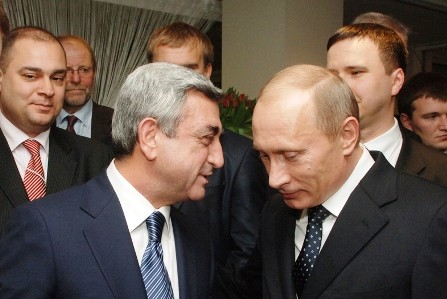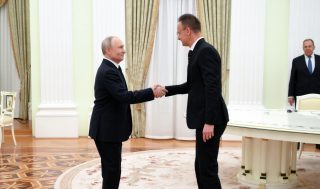Protocol pitched from Moscow

“The most important result of our meeting was the agreement on allocation of military units of non-CSTO countries on the territories of CSTO-countries. From now on in order to allocate military units of a third country on the territory of a CSTO member country, that country has have the consent of all members of the organization. All members of the CSTO agreed with that recommendation. I think this is the best example proving the unity of the organization and its members’ commitment,” said the Kazakhstani president Nursultan Nazarbayev on December 20, 2011, in Moscow on the occasion of signing an agreement on definition of terms for allocation of military units of a third country in any of the member countries of the Collective Security Treaty Organization summit in Moscow.
In addition to that announcement, Vladimir Putin, being the president of Russia at the time, said, “I would propose to start signing the document. Only I want to emphasize for all members that are here that for the CSTO it is very important to sign this document for even stronger cooperation within the organization.”
At that time this agreement signed in Moscow became a topic of active discussions. There were also opinions that Russia, being a dominant country, was limiting the powers of the other members by limiting their right to allocate military units of a third country in their territory, thus limiting their sovereignty. However, in several months it became clear that this decision pursued a longer term and more global goal, which is the creation of Eurasia Union that was proposed by Vladimir Putin in the spring. As it was a vital issue for Russia to create that union, Putin had to tackle the mentioned agreement to move toward that goal.
It was not by chance that right after returning from his vacation and Moscow president Serzh Sargsyan sent the bill on Collective Security Treaty to the parliament for confirmation. This bill is included in the parliament’s fall sitting agenda. A similar bill was sent to the Russian Duma by president Vladimir Putin in June as well. In the near future the parliament will either In consideration of the fact that the bill was sent by the president, obviously it will be approved. In consideration of the importance of Armenia’s membership with Eurasia Union we contacted people from the parliamentary factions to ask their opinions about the issue. Most of them were still having vacation moods and were not even aware of the issues included in the parliament’s agenda.
Deputy chairman of the RPA and the party’s faction head Galust Sahakyan was not aware of the mentioned bill and said, “To be honest, I was in vacation and I am not aware whether that document has reached the parliament or no. However, if the president has signed, it means that it also reflects the opinion of the party because the president of the country is also the resident of the RPA.”
Prosperous Armenia party’s spokesman and PA faction representative Tigran Urikhanyan said that he would be able to comment on that issue only after that bill is submitted to him as an MP. ARF faction’s secretary Aghvan Vardanyan said that he had been in vacation and was not aware of it. We received a similar answer from the ANC faction head Levon Zurabyan as well. The head of Heritage faction Ruben Hakobyan said that he was not aware of the bill but as it was a very important issue, he would be able to comment on it only after reading the document.
























